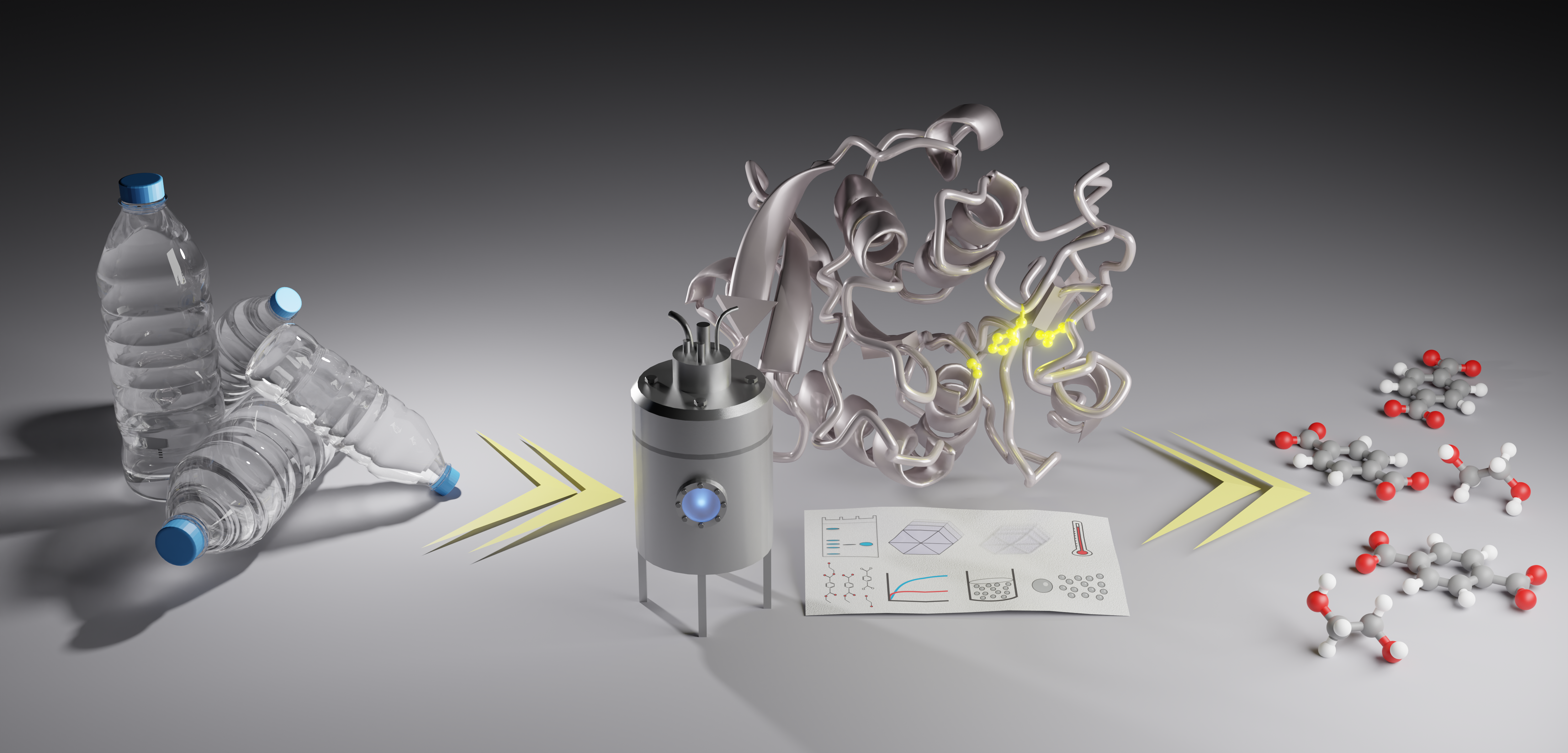In recent years, the media has reported major advances in the recycling of polyethylene terephthalate (PET) thanks to newly discovered enzymes that break the plastic down into its components. However, first success stories from the scientific laboratory are usually followed by silence. PET accounts for 18 percent of the world's plastic production, making it one of the most important plastics in terms of volume. The biotech company Carbios, is, for example, building a plant in the northeast of France that will be finished by 2025 and will be able to recycle 50,000 tons of PET per year. Carbios experts are interested in using the best enzymes for their industrial facility. However, they often find that many results from scientific laboratory research cannot be scaled up to industrial use.
"Some enzymes work well in laboratory experiments for a few hours, but they lose their activity very quickly and the substrate is not completely degraded," says Dr. Weber. This is not a problem in the test tube in a laboratory, but it is when used in a large bioreactor. Together with the biotech company Carbios, Prof. Dr. Uwe Bornscheuer and Dr. Gert Weber have therefore shown how new enzymes for PET degradation can be compared with each other more effectively. "In order to enable upscaling later on, many parameters must be kept within a narrow range, even in laboratory experiments; the starting material must be defined precisely and the test protocols require stricter standardisation in order to improve the assessment of the enzyme’s performance and their application on an industrial scale", explains Professor Bornscheuer. The researchers have therefore developed a standardised PET hydrolysis protocol that defines reaction conditions relevant for hydrolysis on a larger scale. Two specific PET materials were used, firstly a defined PET film and secondly PET granulate from waste bottles, as used by Carbios on a technical scale. They used these materials to test four recently discovered PET-decomposing enzymes: LCC-ICCG, FAST-PETase, HotPETase and PES-H1L92F/Q94Y.
When experimenting under this protocol, they found that two of these enzymes, FAST-PETase and HotPETase, were less suitable for large-scale use, mainly due to their relatively low depolymerisation rates. PES-H1L92F/Q94Y performed better. The fourth candidate, LCC-ICCG, outperformed the other enzymes by far: LCC-ICCG converts 98 percent of PET into the monomeric products terephthalic acid (TPA) and ethylene glycol (EG) in 24 hours. "In addition, we were able to reduce the amount of enzyme required for LCC-ICCG by a factor of three and the reaction temperature from 72 to 68 °C, which makes the use of this enzyme more economical", says Professor Bornscheuer.
"Industrial applications should already be in our minds when carrying out our laboratory research. After all, we are dealing with one of the greatest problems of our time. Plastics are still being produced from fossil raw materials, recycling rates are low and so far, it has mostly been a case of "downcycling" to inferior quality. Plastic waste can now be found in all bodies of water and in soil and is thus already in the food chain. Progress is needed urgently. With the newly defined standards, we can work to separate the wheat from the chaff faster”, says Dr. Gert Weber.
Further Information
Link to publication: Assessment of Four Engineered PET Degrading Enzymes Considering Large-Scale Industrial Applications
Contact at the University of Greifswald
Prof. Dr. Uwe Bornscheuer
Institute of Biochemistry
Felix-Hausdorff-Straße 4, 17489 Greifswald, Germany
Tel.: +49 3834 420 4367
uwe.bornscheueruni-greifswaldde
http://biotech.uni-greifswald.de
ORCID: https://orcid.org/0000-0003-0685-2696
ResearchGate: https://www.researchgate.net/profile/Uwe_Bornscheuer
LinkedIn: https://www.linkedin.com/in/uwe-bornscheuer-1581827a/
Contact at the Helmholtz-Zentrum Berlin
Dr. Gert Weber
Macromolecular Crystallography
Helmholtz-Zentrum Berlin
Albert-Einstein-Str. 15
D-12489 Berlin
Tel.: +49 30 8062 14869
gert.weberhelmholtz-berlinde
ORCID: https://orcid.org/0000-0003-3624-1060
ResearchGate: https://www.researchgate.net/profile/Gert-Weber-2
LinkedIn: https://www.linkedin.com/in/gert-weber-555667220/

